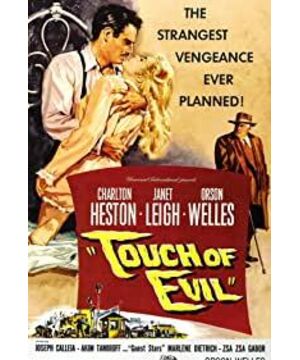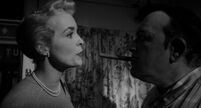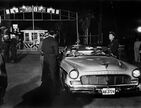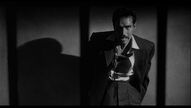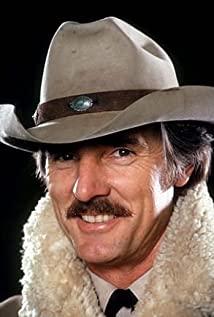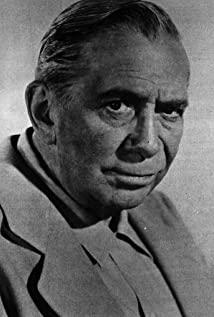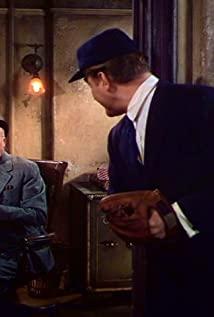Orson Welles' bastardized Film-Noir has only attained its quasi-full-fledged Wellesian treatment in 1998 (apropos of his 58-page memo to the head of Universal upon the film's chopped and re-shot original form), four decades after its release , credited to the meticulous re-editing endeavor led by American editor Walter Murch. This restored version (the closest thing we can label it as a director's cut), clocking in at 111 minutes, finally does justice to its maker's conception, it is as much a blistering moral parable of the seedy law-enforcement as a scrumptious testimonial of Welles' state-of-the-art modality of his cinematic wizardry.
No review can circumnavigate TOUCH OF EVIL's nerve-racking opening three-and-a-half minutes, a part of the furniture among the most mesmeric long-shots ever, flaunting the imminent explosion in our face, but also cunningly opts for the minimum casualty in its aftermath, Welles and his DP Russell Metty do know how to conduct “a moving camera” like a terpsichorean virtuoso, dollying, craning, panning without one discernible hiccup. Truly, Welles' composition is never orthodox (Dutch angles, worm's eye- view shot are the staples), his shrewd perception and ambidextrous orchestration of chiaroscuro, perspective are blank unrivaled, to say nothing of that his camera can navigate on a dime in a poky apartment with his players (including himself) shoving and weaving with precision under his august coordination.
The story, loosely based on Whit Masterson's novel, is a plain-sailing Manichaean conflict takes place in a Mexico-USA border-town, between an upstanding Mexican narcotic official Miguel Vargas (a mustachioed Heston, who seems to obliviously sport his natural American accent to play a Mexican, garlanded with a halo of rectitude and grit) and a peremptory American senior police captain Hank Quinlan (Welles himself, assisted by prosthetics and make-up, lording it over with an elephantine pall), whose evidence-planting modus operandi prompts Miguel to impugn his track records. Abetted by and colluded with a slimy criminal mind Joe Grandi (Tamiroff) to frame Miguel and his American wife Susie (a naively game Janet Leigh,who is again stranded in another off-season motel as a marked woman when a sinister plan is brewing to jolt the living daylights out of her), the newly-weds are on their way of their honeymoon in the beginning, Hank begins to descend further down to the point of no return (he has been dried out for 12 years before falling off the wagon), “You have no future left” utters Tanya (Dietrich, in her memorable cameo with a wacky wig and gypsy get-up), an old-flame who barely can recognize him at first glance, a death knell tolls when he clumsily leaves his cane in the murder scene where he intends to set up Susie for drug-abuse and homicide (how can anyone believe a girl like Susie can physically strangle a man to death under the doped influence?).Hank begins to descend further down to the point of no return (he has been dried out for 12 years before falling off the wagon), “You have no future left” utters Tanya (Dietrich, in her memorable cameo with a wacky wig and gypsy get-up), an old-flame who barely can recognize him at first glance, a death knell tolls when he clumsily leaves his cane in the murder scene where he intends to set up Susie for drug-abuse and homicide (how can anyone believe a girl like Susie can physically strangle a man to death under the doped influence?).Hank begins to descend further down to the point of no return (he has been dried out for 12 years before falling off the wagon), “You have no future left” utters Tanya (Dietrich, in her memorable cameo with a wacky wig and gypsy get-up), an old-flame who barely can recognize him at first glance, a death knell tolls when he clumsily leaves his cane in the murder scene where he intends to set up Susie for drug-abuse and homicide (how can anyone believe a girl like Susie can physically strangle a man to death under the doped influence?).a death knell tolls when he clumsily leaves his cane in the murder scene where he intends to set up Susie for drug-abuse and homicide (how can anyone believe a girl like Susie can physically strangle a man to death under the doped influence?).a death knell tolls when he clumsily leaves his cane in the murder scene where he intends to set up Susie for drug-abuse and homicide (how can anyone believe a girl like Susie can physically strangle a man to death under the doped influence?).
Hank is not a brilliant schemer, nor is he an objectively evil character, what ironic is that, apparently in most cases, his hunches are right, evidence-planting is his go-to shortcut to convict the guilty parties, but the Achilles heel is that his method is not fail-safe (swimming against the undertow of the deification of a human being), what leads to his unmaking is his hubris, obstinacy, lack of morality and a strong whiff of xenophobia. There is pathos and tension lurking in the climax when he has the chance to pull that trigger, but Welles is not a misanthropic cynic, Hank is a bumptious but tragic figure, mired in his own defects with no resort of alleviation, he is a soft touch too, all he needs is a nudge to execute the unspeakable transgressions, exemplifies an archetypal canker in the hierarchy,bestowed with power but innately prone to corruption.
Strong supporting turns galore, Akim Tamiroff, shapeshifting between the boss and the stooge (depends on who he is facing); Joseph Calleia, who plays Pete Menzies, Hank's loyal partner, and inputs a rather complex inscape with diligence when the plot begins to turn the table; and Dennis Weaver as the craven night manager of the motel, a harbinger and possible prototype of Norman Bates who will terrorize the screen (and Ms. Leigh as well) two years later in Hitchcock's PSYCHO (1960), which would usher in a new formal of psychological/moral dramatization and sign the valediction of the classic Noir-era for which TOUCH OF EVIL is its last hurrah.
referential points: Welles' THE LADY FROM SHANGHAI (1947, 7.7/10), Carol Reed's THE THIRD MAN (1949, 8.3/10).
View more about Touch of Evil reviews


